HI6025 Accounting Theory: Positive Accounting Theories & Implications
VerifiedAdded on 2024/04/26
|13
|2255
|330
Report
AI Summary
This report provides an analysis of positive accounting theories and their implications on financial statements. It delves into three key hypotheses: the bonus plan hypothesis, which suggests managers adopt accounting policies to maximize their bonuses; the debt covenant hypothesis, where managers aim to present a healthy financial position to satisfy creditors; and the political cost hypothesis, where larger companies may reduce reported profits to avoid political scrutiny and higher taxes. The report discusses how these theories influence managerial decisions and disclosures, often balancing personal and company interests. Research findings and statistical interpretations are presented to either support or reject the null hypotheses associated with each theory, providing a comprehensive understanding of the practical applications and limitations of positive accounting theories in real-world accounting practices. Desklib provides access to similar solved assignments and study resources.
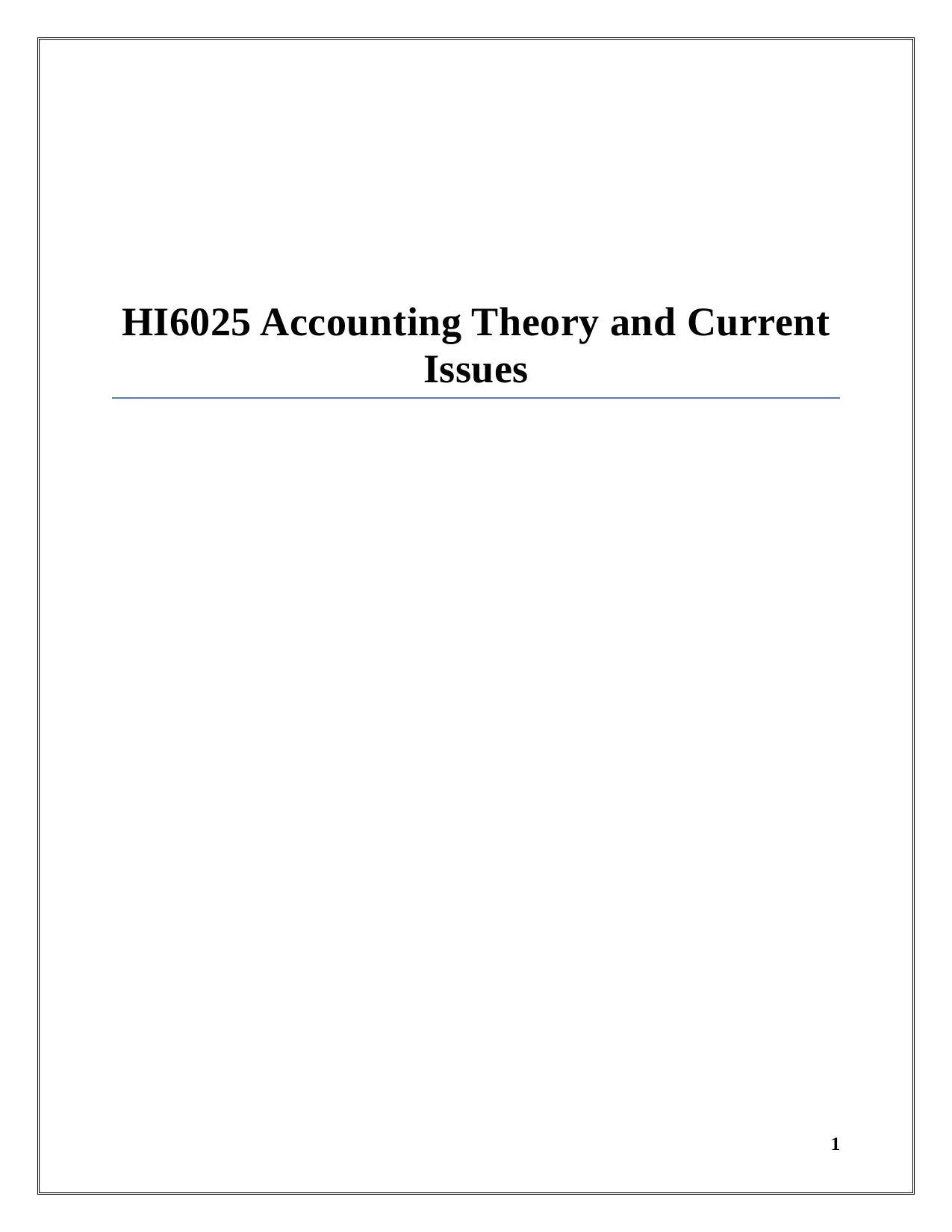
HI6025 Accounting Theory and Current
Issues
1
Issues
1
Paraphrase This Document
Need a fresh take? Get an instant paraphrase of this document with our AI Paraphraser
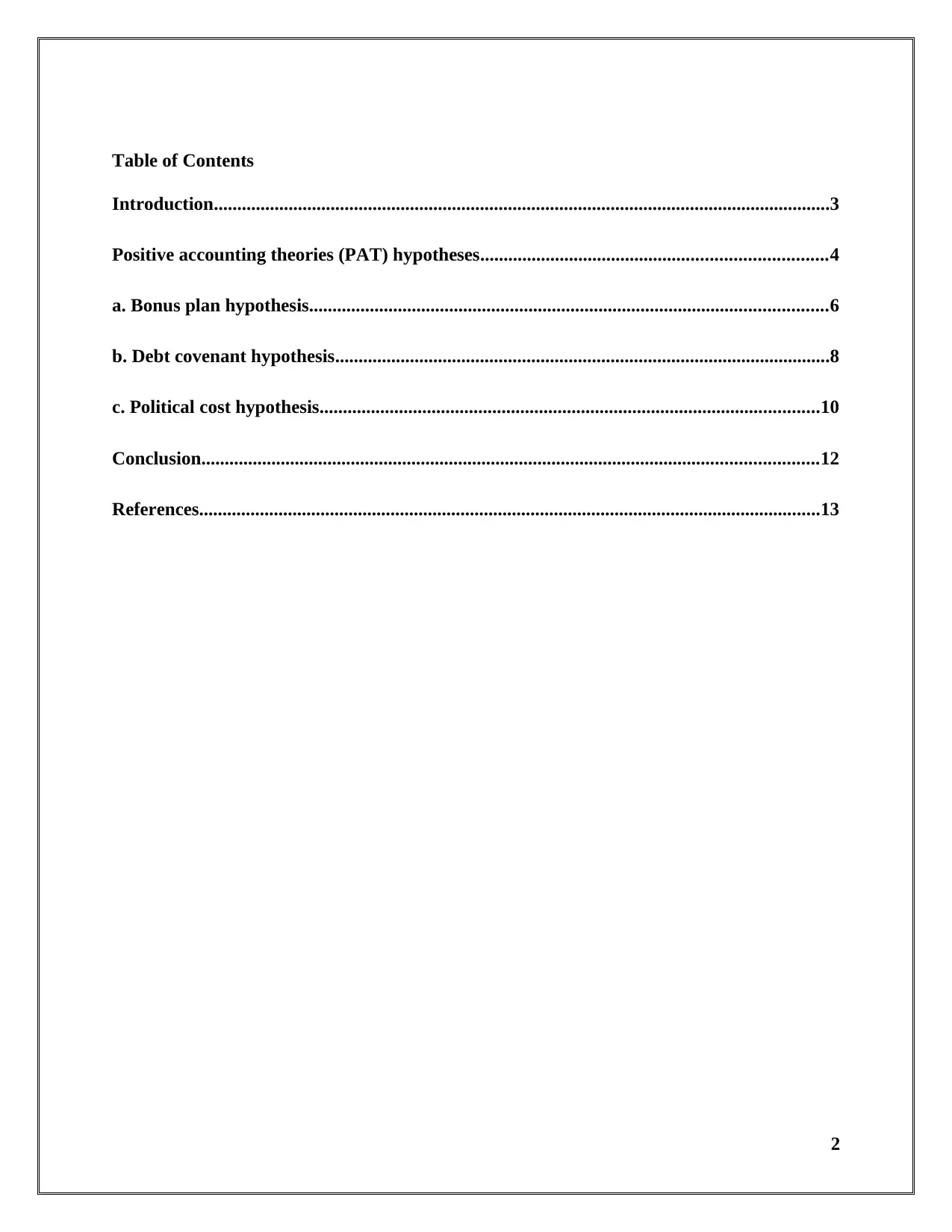
Table of Contents
Introduction....................................................................................................................................3
Positive accounting theories (PAT) hypotheses..........................................................................4
a. Bonus plan hypothesis...............................................................................................................6
b. Debt covenant hypothesis..........................................................................................................8
c. Political cost hypothesis...........................................................................................................10
Conclusion....................................................................................................................................12
References.....................................................................................................................................13
2
Introduction....................................................................................................................................3
Positive accounting theories (PAT) hypotheses..........................................................................4
a. Bonus plan hypothesis...............................................................................................................6
b. Debt covenant hypothesis..........................................................................................................8
c. Political cost hypothesis...........................................................................................................10
Conclusion....................................................................................................................................12
References.....................................................................................................................................13
2
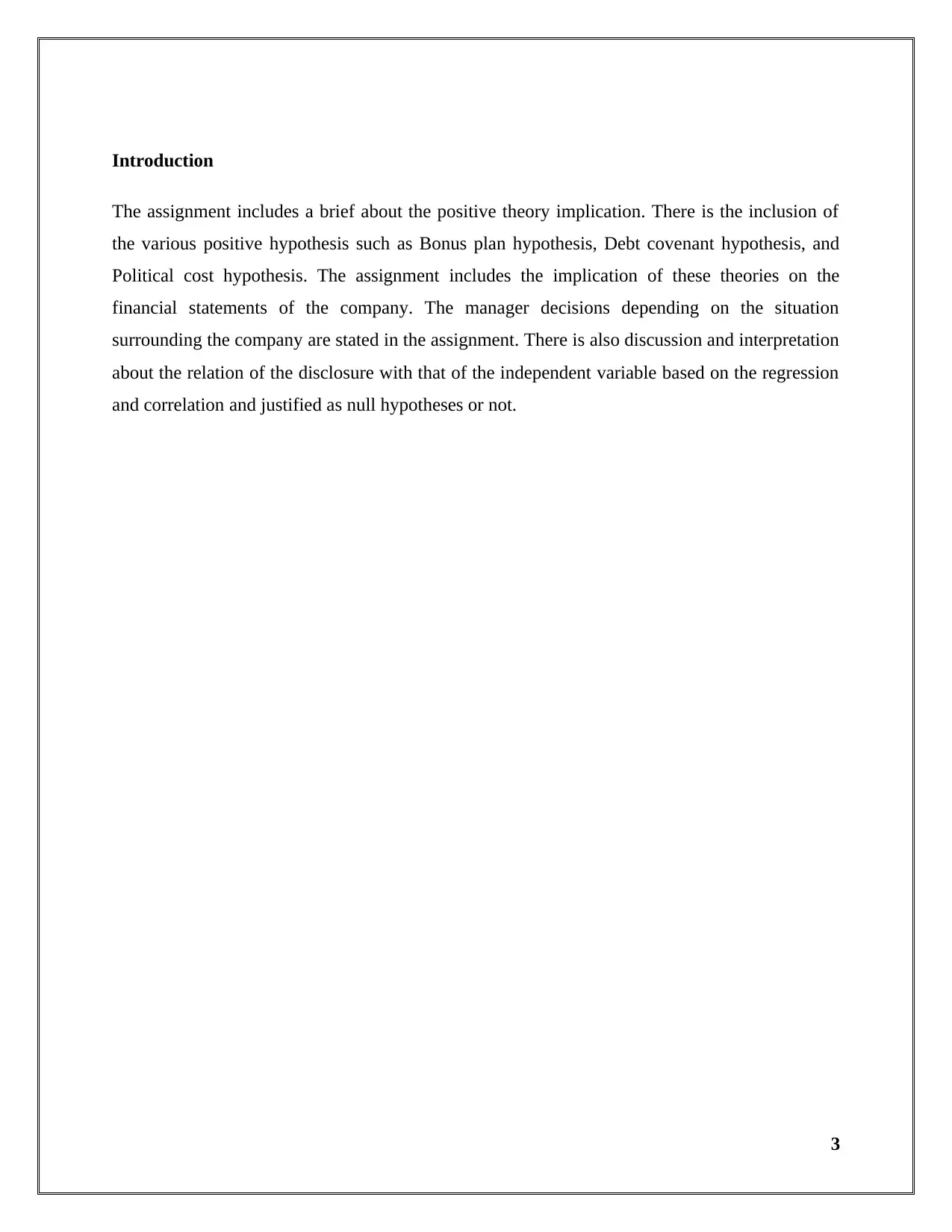
Introduction
The assignment includes a brief about the positive theory implication. There is the inclusion of
the various positive hypothesis such as Bonus plan hypothesis, Debt covenant hypothesis, and
Political cost hypothesis. The assignment includes the implication of these theories on the
financial statements of the company. The manager decisions depending on the situation
surrounding the company are stated in the assignment. There is also discussion and interpretation
about the relation of the disclosure with that of the independent variable based on the regression
and correlation and justified as null hypotheses or not.
3
The assignment includes a brief about the positive theory implication. There is the inclusion of
the various positive hypothesis such as Bonus plan hypothesis, Debt covenant hypothesis, and
Political cost hypothesis. The assignment includes the implication of these theories on the
financial statements of the company. The manager decisions depending on the situation
surrounding the company are stated in the assignment. There is also discussion and interpretation
about the relation of the disclosure with that of the independent variable based on the regression
and correlation and justified as null hypotheses or not.
3
⊘ This is a preview!⊘
Do you want full access?
Subscribe today to unlock all pages.

Trusted by 1+ million students worldwide
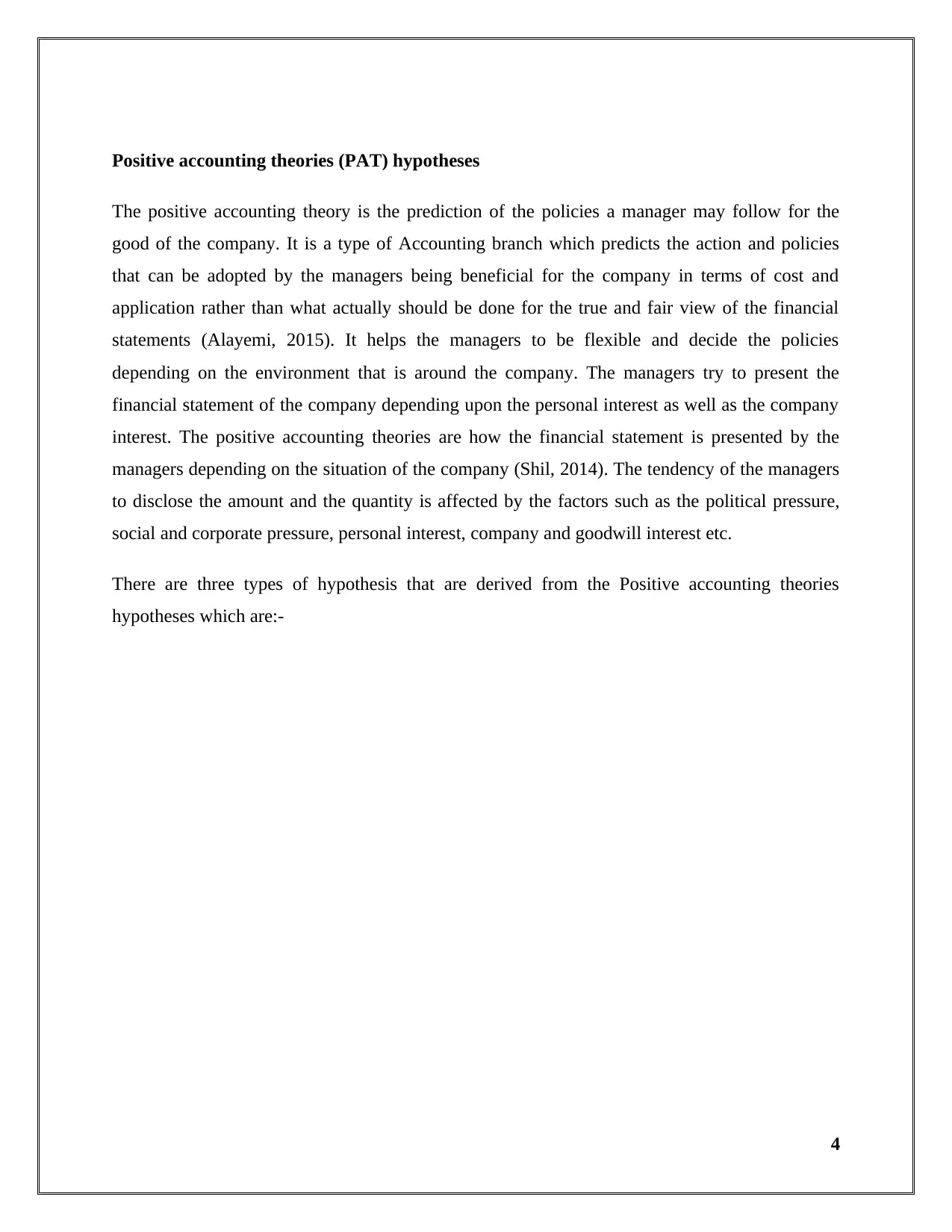
Positive accounting theories (PAT) hypotheses
The positive accounting theory is the prediction of the policies a manager may follow for the
good of the company. It is a type of Accounting branch which predicts the action and policies
that can be adopted by the managers being beneficial for the company in terms of cost and
application rather than what actually should be done for the true and fair view of the financial
statements (Alayemi, 2015). It helps the managers to be flexible and decide the policies
depending on the environment that is around the company. The managers try to present the
financial statement of the company depending upon the personal interest as well as the company
interest. The positive accounting theories are how the financial statement is presented by the
managers depending on the situation of the company (Shil, 2014). The tendency of the managers
to disclose the amount and the quantity is affected by the factors such as the political pressure,
social and corporate pressure, personal interest, company and goodwill interest etc.
There are three types of hypothesis that are derived from the Positive accounting theories
hypotheses which are:-
4
The positive accounting theory is the prediction of the policies a manager may follow for the
good of the company. It is a type of Accounting branch which predicts the action and policies
that can be adopted by the managers being beneficial for the company in terms of cost and
application rather than what actually should be done for the true and fair view of the financial
statements (Alayemi, 2015). It helps the managers to be flexible and decide the policies
depending on the environment that is around the company. The managers try to present the
financial statement of the company depending upon the personal interest as well as the company
interest. The positive accounting theories are how the financial statement is presented by the
managers depending on the situation of the company (Shil, 2014). The tendency of the managers
to disclose the amount and the quantity is affected by the factors such as the political pressure,
social and corporate pressure, personal interest, company and goodwill interest etc.
There are three types of hypothesis that are derived from the Positive accounting theories
hypotheses which are:-
4
Paraphrase This Document
Need a fresh take? Get an instant paraphrase of this document with our AI Paraphraser
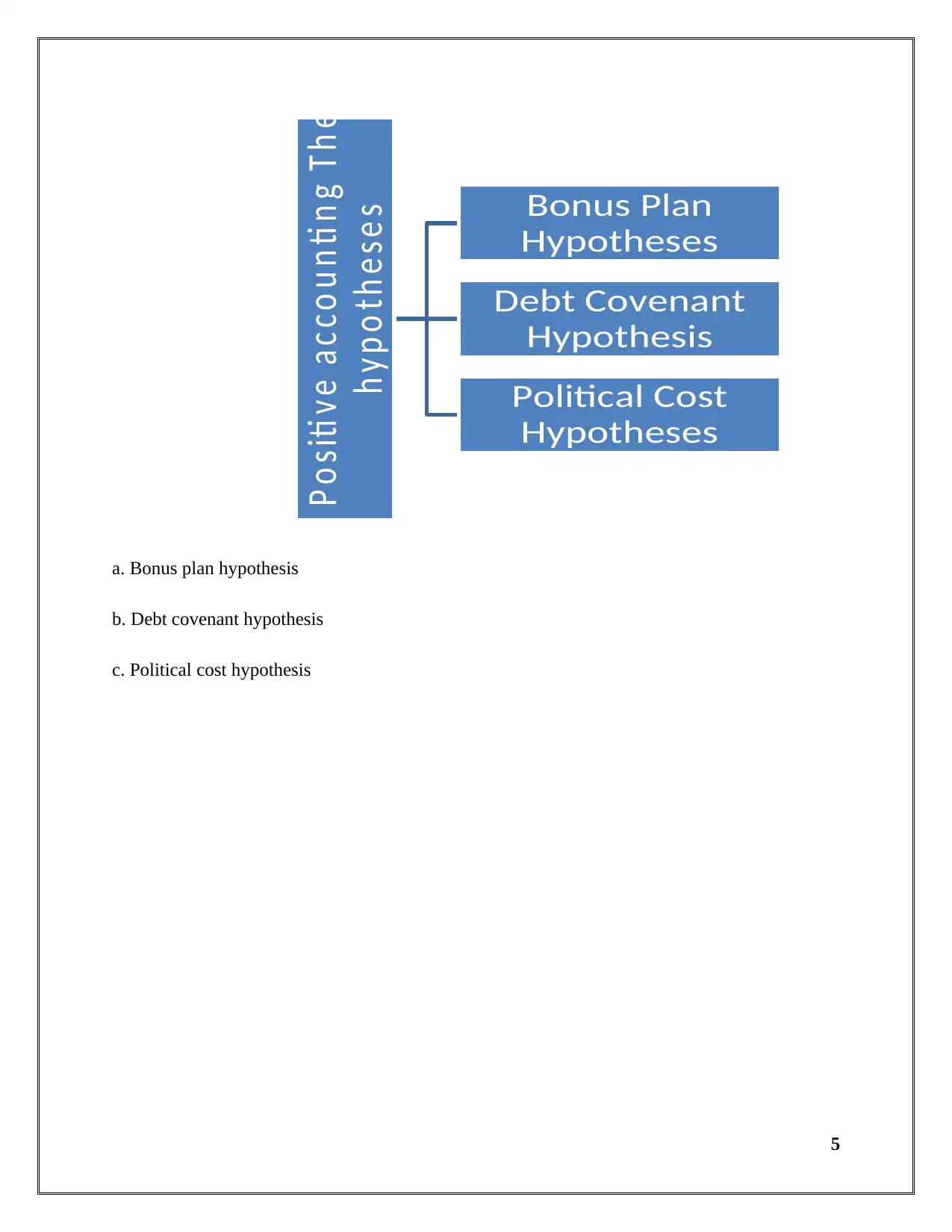
a. Bonus plan hypothesis
b. Debt covenant hypothesis
c. Political cost hypothesis
5
P o s iti v e a c c o u n ti n g T h e o r ie s
h y p o th e s e s Bonus Plan
Hypotheses
Debt Covenant
Hypothesis
Political Cost
Hypotheses
b. Debt covenant hypothesis
c. Political cost hypothesis
5
P o s iti v e a c c o u n ti n g T h e o r ie s
h y p o th e s e s Bonus Plan
Hypotheses
Debt Covenant
Hypothesis
Political Cost
Hypotheses
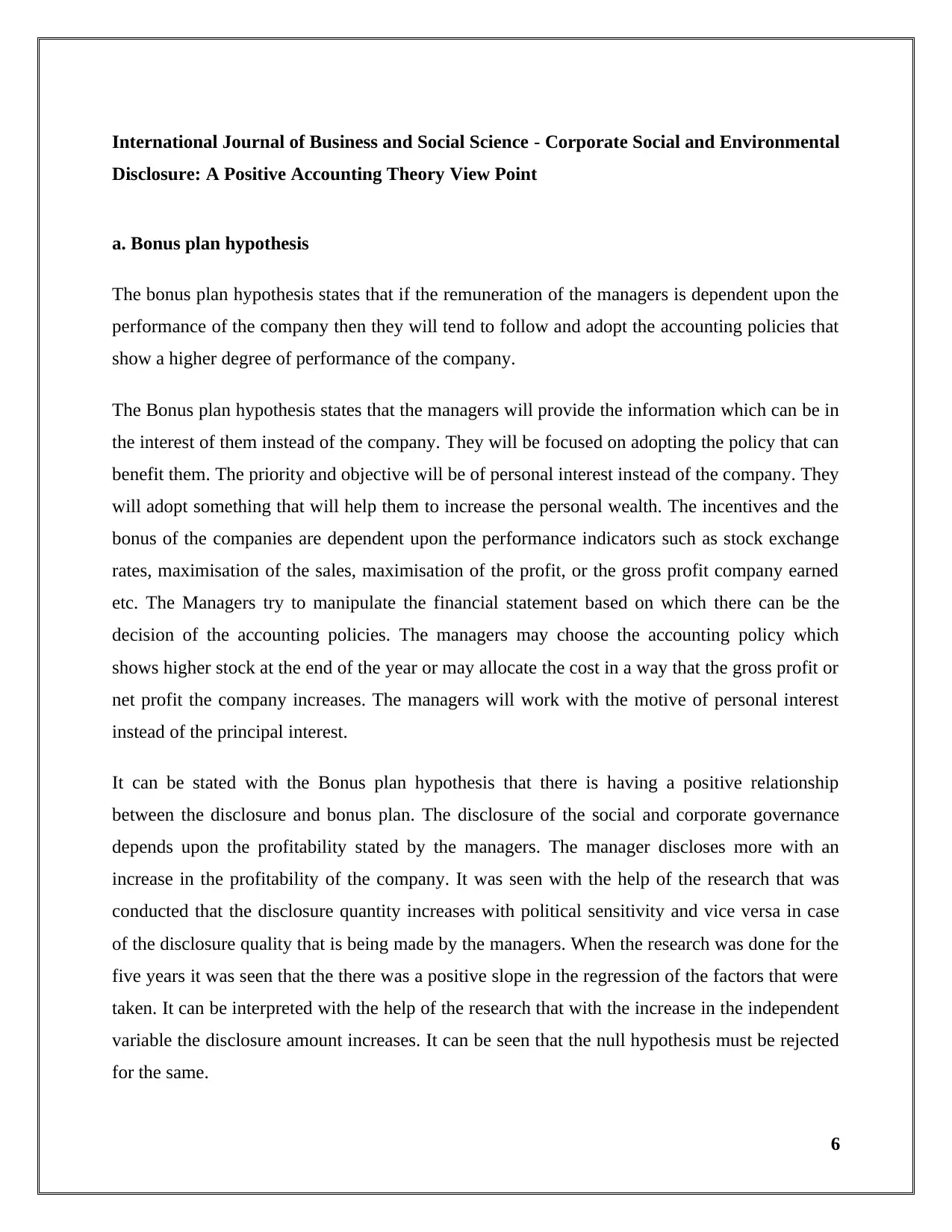
International Journal of Business and Social Science - Corporate Social and Environmental
Disclosure: A Positive Accounting Theory View Point
a. Bonus plan hypothesis
The bonus plan hypothesis states that if the remuneration of the managers is dependent upon the
performance of the company then they will tend to follow and adopt the accounting policies that
show a higher degree of performance of the company.
The Bonus plan hypothesis states that the managers will provide the information which can be in
the interest of them instead of the company. They will be focused on adopting the policy that can
benefit them. The priority and objective will be of personal interest instead of the company. They
will adopt something that will help them to increase the personal wealth. The incentives and the
bonus of the companies are dependent upon the performance indicators such as stock exchange
rates, maximisation of the sales, maximisation of the profit, or the gross profit company earned
etc. The Managers try to manipulate the financial statement based on which there can be the
decision of the accounting policies. The managers may choose the accounting policy which
shows higher stock at the end of the year or may allocate the cost in a way that the gross profit or
net profit the company increases. The managers will work with the motive of personal interest
instead of the principal interest.
It can be stated with the Bonus plan hypothesis that there is having a positive relationship
between the disclosure and bonus plan. The disclosure of the social and corporate governance
depends upon the profitability stated by the managers. The manager discloses more with an
increase in the profitability of the company. It was seen with the help of the research that was
conducted that the disclosure quantity increases with political sensitivity and vice versa in case
of the disclosure quality that is being made by the managers. When the research was done for the
five years it was seen that the there was a positive slope in the regression of the factors that were
taken. It can be interpreted with the help of the research that with the increase in the independent
variable the disclosure amount increases. It can be seen that the null hypothesis must be rejected
for the same.
6
Disclosure: A Positive Accounting Theory View Point
a. Bonus plan hypothesis
The bonus plan hypothesis states that if the remuneration of the managers is dependent upon the
performance of the company then they will tend to follow and adopt the accounting policies that
show a higher degree of performance of the company.
The Bonus plan hypothesis states that the managers will provide the information which can be in
the interest of them instead of the company. They will be focused on adopting the policy that can
benefit them. The priority and objective will be of personal interest instead of the company. They
will adopt something that will help them to increase the personal wealth. The incentives and the
bonus of the companies are dependent upon the performance indicators such as stock exchange
rates, maximisation of the sales, maximisation of the profit, or the gross profit company earned
etc. The Managers try to manipulate the financial statement based on which there can be the
decision of the accounting policies. The managers may choose the accounting policy which
shows higher stock at the end of the year or may allocate the cost in a way that the gross profit or
net profit the company increases. The managers will work with the motive of personal interest
instead of the principal interest.
It can be stated with the Bonus plan hypothesis that there is having a positive relationship
between the disclosure and bonus plan. The disclosure of the social and corporate governance
depends upon the profitability stated by the managers. The manager discloses more with an
increase in the profitability of the company. It was seen with the help of the research that was
conducted that the disclosure quantity increases with political sensitivity and vice versa in case
of the disclosure quality that is being made by the managers. When the research was done for the
five years it was seen that the there was a positive slope in the regression of the factors that were
taken. It can be interpreted with the help of the research that with the increase in the independent
variable the disclosure amount increases. It can be seen that the null hypothesis must be rejected
for the same.
6
⊘ This is a preview!⊘
Do you want full access?
Subscribe today to unlock all pages.

Trusted by 1+ million students worldwide
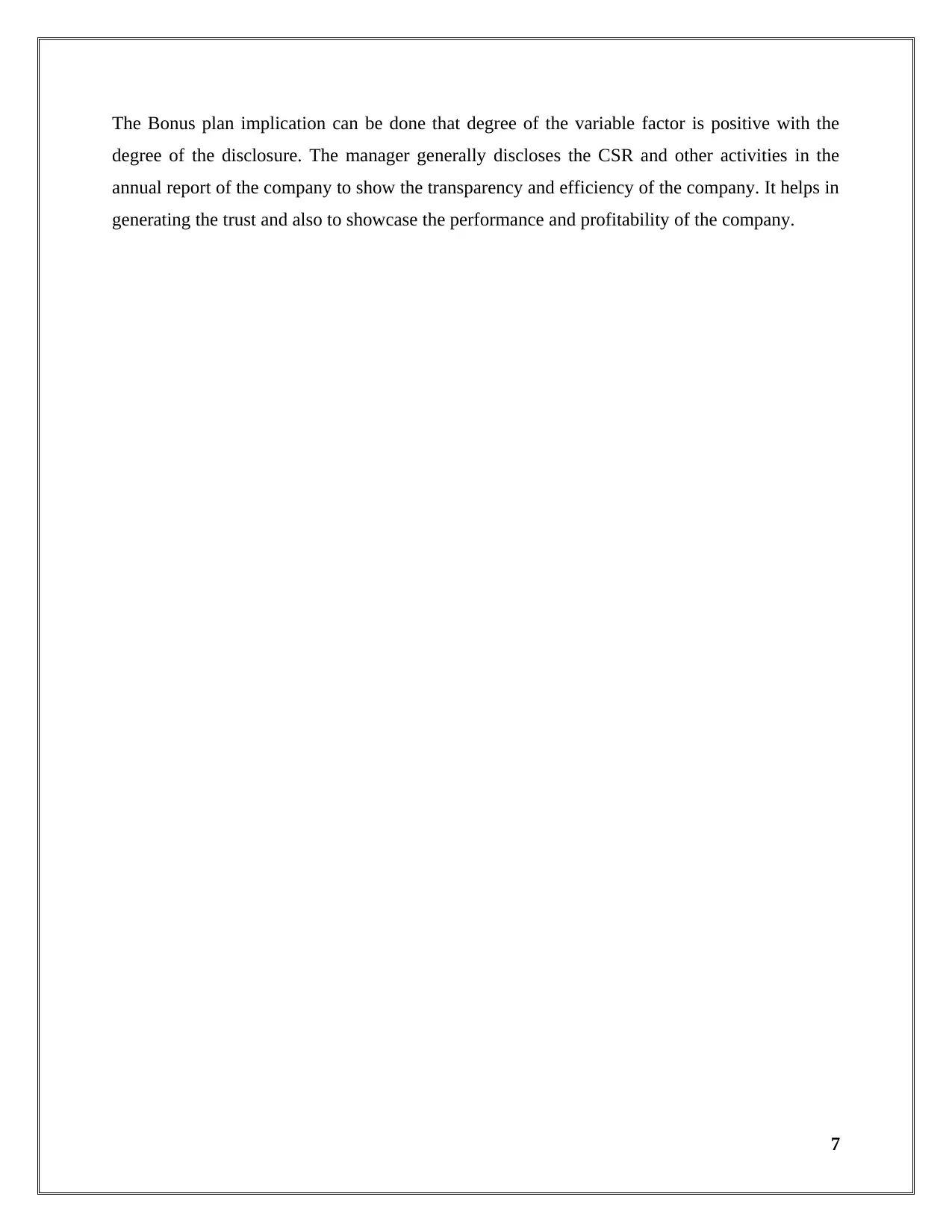
The Bonus plan implication can be done that degree of the variable factor is positive with the
degree of the disclosure. The manager generally discloses the CSR and other activities in the
annual report of the company to show the transparency and efficiency of the company. It helps in
generating the trust and also to showcase the performance and profitability of the company.
7
degree of the disclosure. The manager generally discloses the CSR and other activities in the
annual report of the company to show the transparency and efficiency of the company. It helps in
generating the trust and also to showcase the performance and profitability of the company.
7
Paraphrase This Document
Need a fresh take? Get an instant paraphrase of this document with our AI Paraphraser
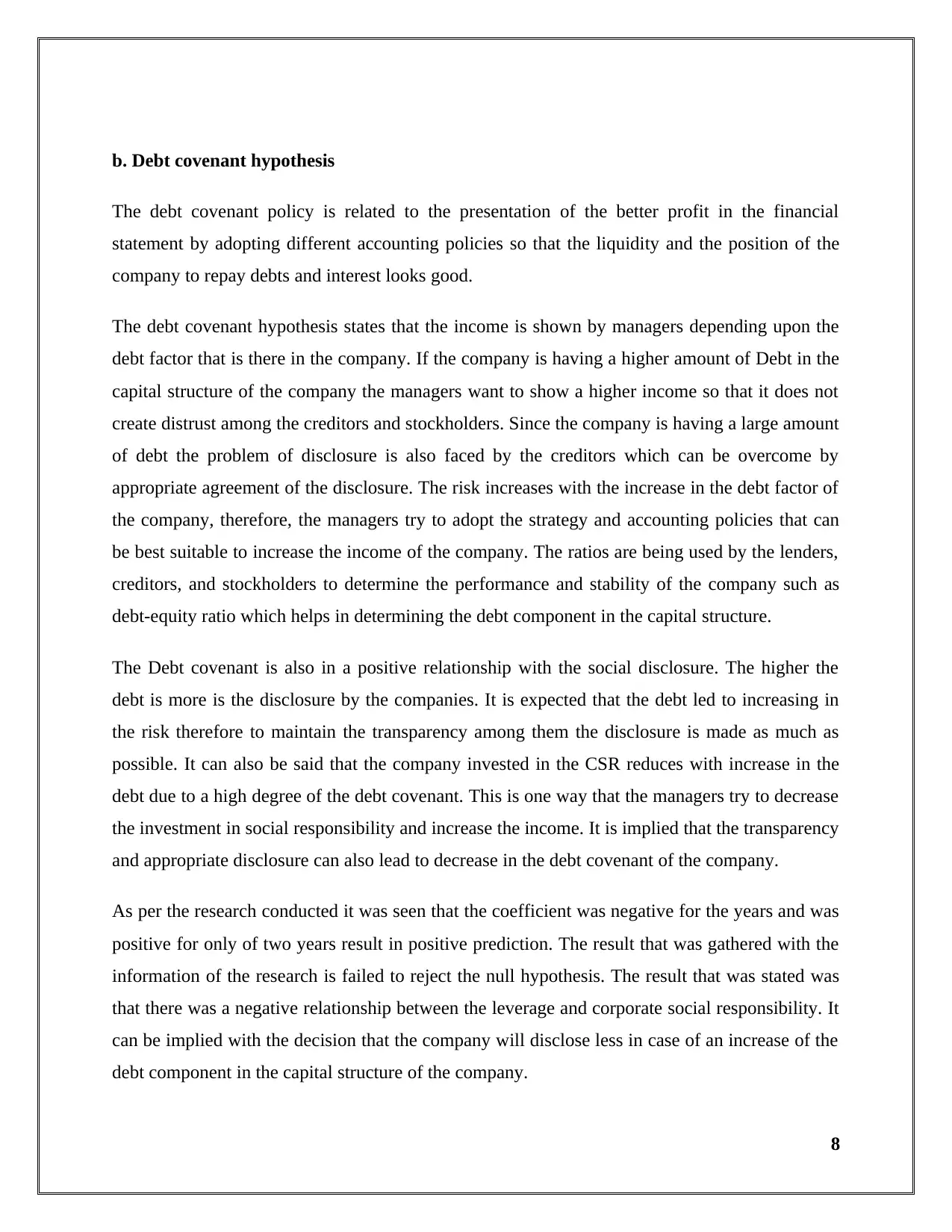
b. Debt covenant hypothesis
The debt covenant policy is related to the presentation of the better profit in the financial
statement by adopting different accounting policies so that the liquidity and the position of the
company to repay debts and interest looks good.
The debt covenant hypothesis states that the income is shown by managers depending upon the
debt factor that is there in the company. If the company is having a higher amount of Debt in the
capital structure of the company the managers want to show a higher income so that it does not
create distrust among the creditors and stockholders. Since the company is having a large amount
of debt the problem of disclosure is also faced by the creditors which can be overcome by
appropriate agreement of the disclosure. The risk increases with the increase in the debt factor of
the company, therefore, the managers try to adopt the strategy and accounting policies that can
be best suitable to increase the income of the company. The ratios are being used by the lenders,
creditors, and stockholders to determine the performance and stability of the company such as
debt-equity ratio which helps in determining the debt component in the capital structure.
The Debt covenant is also in a positive relationship with the social disclosure. The higher the
debt is more is the disclosure by the companies. It is expected that the debt led to increasing in
the risk therefore to maintain the transparency among them the disclosure is made as much as
possible. It can also be said that the company invested in the CSR reduces with increase in the
debt due to a high degree of the debt covenant. This is one way that the managers try to decrease
the investment in social responsibility and increase the income. It is implied that the transparency
and appropriate disclosure can also lead to decrease in the debt covenant of the company.
As per the research conducted it was seen that the coefficient was negative for the years and was
positive for only of two years result in positive prediction. The result that was gathered with the
information of the research is failed to reject the null hypothesis. The result that was stated was
that there was a negative relationship between the leverage and corporate social responsibility. It
can be implied with the decision that the company will disclose less in case of an increase of the
debt component in the capital structure of the company.
8
The debt covenant policy is related to the presentation of the better profit in the financial
statement by adopting different accounting policies so that the liquidity and the position of the
company to repay debts and interest looks good.
The debt covenant hypothesis states that the income is shown by managers depending upon the
debt factor that is there in the company. If the company is having a higher amount of Debt in the
capital structure of the company the managers want to show a higher income so that it does not
create distrust among the creditors and stockholders. Since the company is having a large amount
of debt the problem of disclosure is also faced by the creditors which can be overcome by
appropriate agreement of the disclosure. The risk increases with the increase in the debt factor of
the company, therefore, the managers try to adopt the strategy and accounting policies that can
be best suitable to increase the income of the company. The ratios are being used by the lenders,
creditors, and stockholders to determine the performance and stability of the company such as
debt-equity ratio which helps in determining the debt component in the capital structure.
The Debt covenant is also in a positive relationship with the social disclosure. The higher the
debt is more is the disclosure by the companies. It is expected that the debt led to increasing in
the risk therefore to maintain the transparency among them the disclosure is made as much as
possible. It can also be said that the company invested in the CSR reduces with increase in the
debt due to a high degree of the debt covenant. This is one way that the managers try to decrease
the investment in social responsibility and increase the income. It is implied that the transparency
and appropriate disclosure can also lead to decrease in the debt covenant of the company.
As per the research conducted it was seen that the coefficient was negative for the years and was
positive for only of two years result in positive prediction. The result that was gathered with the
information of the research is failed to reject the null hypothesis. The result that was stated was
that there was a negative relationship between the leverage and corporate social responsibility. It
can be implied with the decision that the company will disclose less in case of an increase of the
debt component in the capital structure of the company.
8
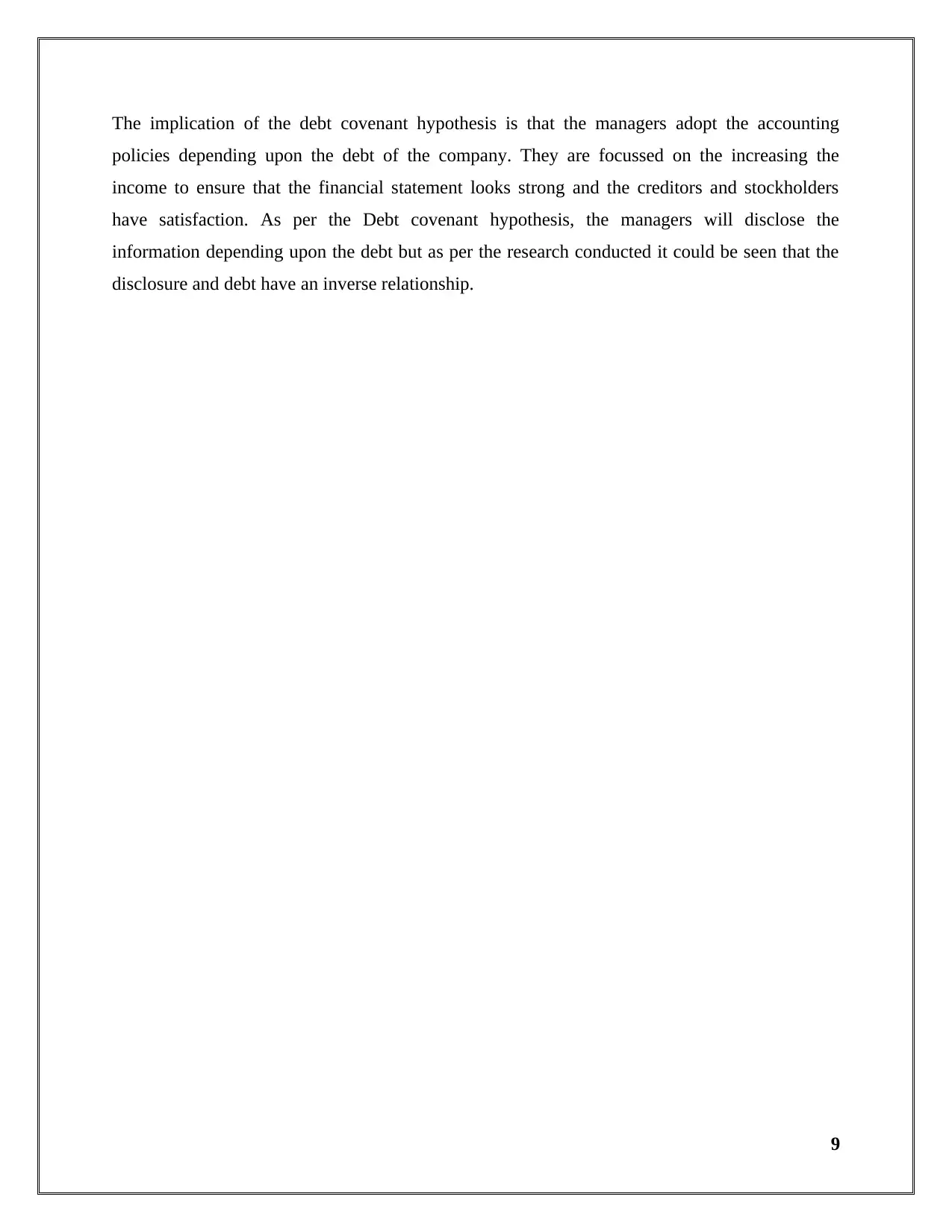
The implication of the debt covenant hypothesis is that the managers adopt the accounting
policies depending upon the debt of the company. They are focussed on the increasing the
income to ensure that the financial statement looks strong and the creditors and stockholders
have satisfaction. As per the Debt covenant hypothesis, the managers will disclose the
information depending upon the debt but as per the research conducted it could be seen that the
disclosure and debt have an inverse relationship.
9
policies depending upon the debt of the company. They are focussed on the increasing the
income to ensure that the financial statement looks strong and the creditors and stockholders
have satisfaction. As per the Debt covenant hypothesis, the managers will disclose the
information depending upon the debt but as per the research conducted it could be seen that the
disclosure and debt have an inverse relationship.
9
⊘ This is a preview!⊘
Do you want full access?
Subscribe today to unlock all pages.

Trusted by 1+ million students worldwide
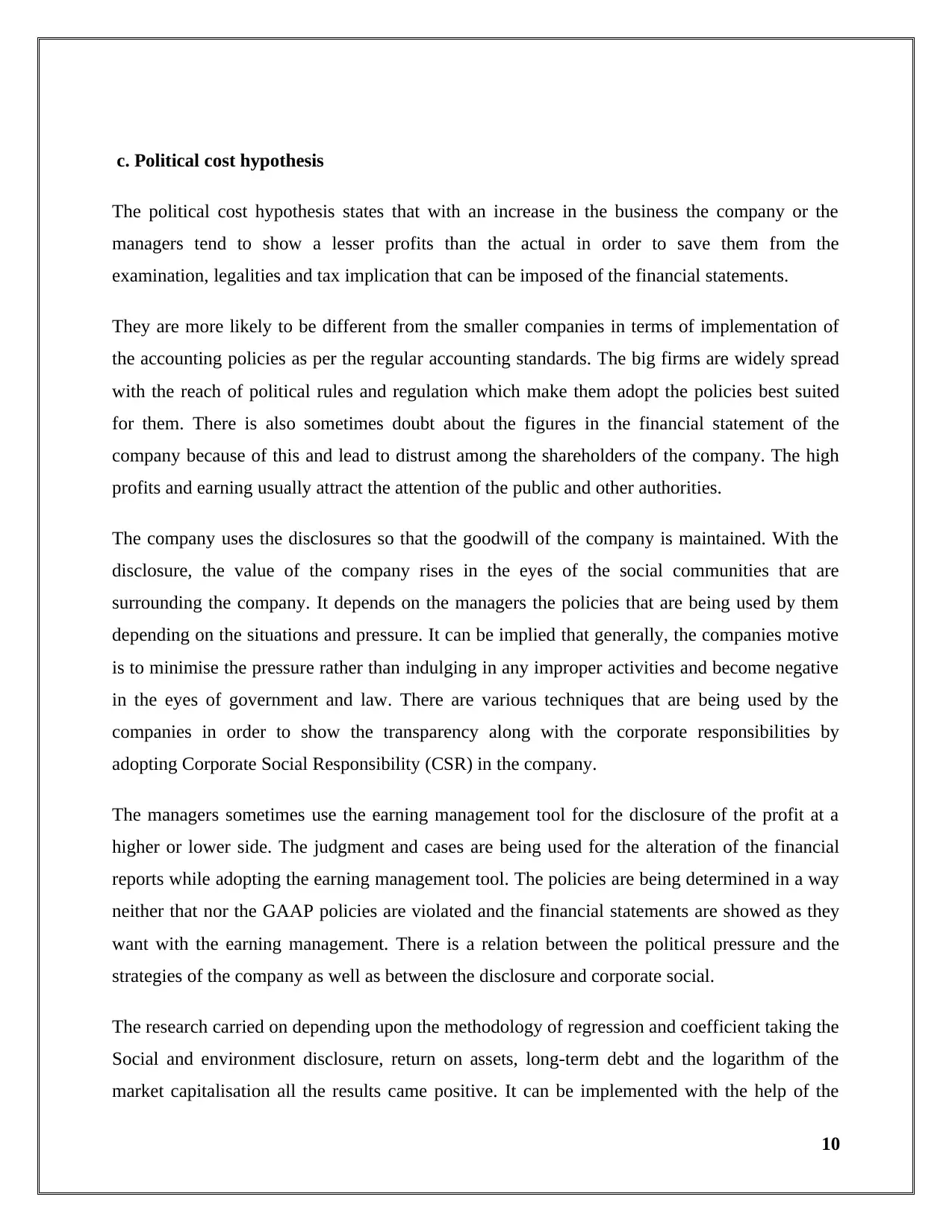
c. Political cost hypothesis
The political cost hypothesis states that with an increase in the business the company or the
managers tend to show a lesser profits than the actual in order to save them from the
examination, legalities and tax implication that can be imposed of the financial statements.
They are more likely to be different from the smaller companies in terms of implementation of
the accounting policies as per the regular accounting standards. The big firms are widely spread
with the reach of political rules and regulation which make them adopt the policies best suited
for them. There is also sometimes doubt about the figures in the financial statement of the
company because of this and lead to distrust among the shareholders of the company. The high
profits and earning usually attract the attention of the public and other authorities.
The company uses the disclosures so that the goodwill of the company is maintained. With the
disclosure, the value of the company rises in the eyes of the social communities that are
surrounding the company. It depends on the managers the policies that are being used by them
depending on the situations and pressure. It can be implied that generally, the companies motive
is to minimise the pressure rather than indulging in any improper activities and become negative
in the eyes of government and law. There are various techniques that are being used by the
companies in order to show the transparency along with the corporate responsibilities by
adopting Corporate Social Responsibility (CSR) in the company.
The managers sometimes use the earning management tool for the disclosure of the profit at a
higher or lower side. The judgment and cases are being used for the alteration of the financial
reports while adopting the earning management tool. The policies are being determined in a way
neither that nor the GAAP policies are violated and the financial statements are showed as they
want with the earning management. There is a relation between the political pressure and the
strategies of the company as well as between the disclosure and corporate social.
The research carried on depending upon the methodology of regression and coefficient taking the
Social and environment disclosure, return on assets, long-term debt and the logarithm of the
market capitalisation all the results came positive. It can be implemented with the help of the
10
The political cost hypothesis states that with an increase in the business the company or the
managers tend to show a lesser profits than the actual in order to save them from the
examination, legalities and tax implication that can be imposed of the financial statements.
They are more likely to be different from the smaller companies in terms of implementation of
the accounting policies as per the regular accounting standards. The big firms are widely spread
with the reach of political rules and regulation which make them adopt the policies best suited
for them. There is also sometimes doubt about the figures in the financial statement of the
company because of this and lead to distrust among the shareholders of the company. The high
profits and earning usually attract the attention of the public and other authorities.
The company uses the disclosures so that the goodwill of the company is maintained. With the
disclosure, the value of the company rises in the eyes of the social communities that are
surrounding the company. It depends on the managers the policies that are being used by them
depending on the situations and pressure. It can be implied that generally, the companies motive
is to minimise the pressure rather than indulging in any improper activities and become negative
in the eyes of government and law. There are various techniques that are being used by the
companies in order to show the transparency along with the corporate responsibilities by
adopting Corporate Social Responsibility (CSR) in the company.
The managers sometimes use the earning management tool for the disclosure of the profit at a
higher or lower side. The judgment and cases are being used for the alteration of the financial
reports while adopting the earning management tool. The policies are being determined in a way
neither that nor the GAAP policies are violated and the financial statements are showed as they
want with the earning management. There is a relation between the political pressure and the
strategies of the company as well as between the disclosure and corporate social.
The research carried on depending upon the methodology of regression and coefficient taking the
Social and environment disclosure, return on assets, long-term debt and the logarithm of the
market capitalisation all the results came positive. It can be implemented with the help of the
10
Paraphrase This Document
Need a fresh take? Get an instant paraphrase of this document with our AI Paraphraser
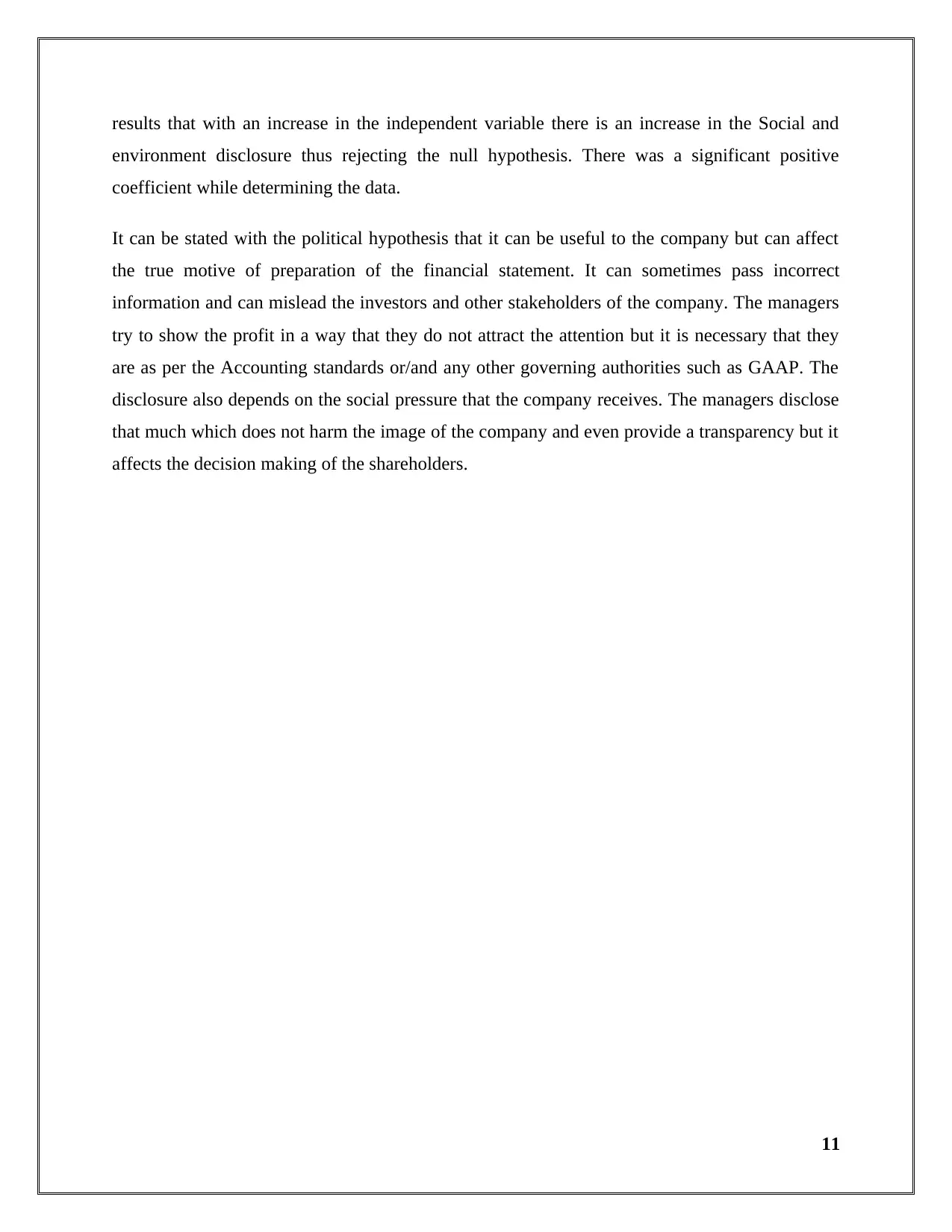
results that with an increase in the independent variable there is an increase in the Social and
environment disclosure thus rejecting the null hypothesis. There was a significant positive
coefficient while determining the data.
It can be stated with the political hypothesis that it can be useful to the company but can affect
the true motive of preparation of the financial statement. It can sometimes pass incorrect
information and can mislead the investors and other stakeholders of the company. The managers
try to show the profit in a way that they do not attract the attention but it is necessary that they
are as per the Accounting standards or/and any other governing authorities such as GAAP. The
disclosure also depends on the social pressure that the company receives. The managers disclose
that much which does not harm the image of the company and even provide a transparency but it
affects the decision making of the shareholders.
11
environment disclosure thus rejecting the null hypothesis. There was a significant positive
coefficient while determining the data.
It can be stated with the political hypothesis that it can be useful to the company but can affect
the true motive of preparation of the financial statement. It can sometimes pass incorrect
information and can mislead the investors and other stakeholders of the company. The managers
try to show the profit in a way that they do not attract the attention but it is necessary that they
are as per the Accounting standards or/and any other governing authorities such as GAAP. The
disclosure also depends on the social pressure that the company receives. The managers disclose
that much which does not harm the image of the company and even provide a transparency but it
affects the decision making of the shareholders.
11
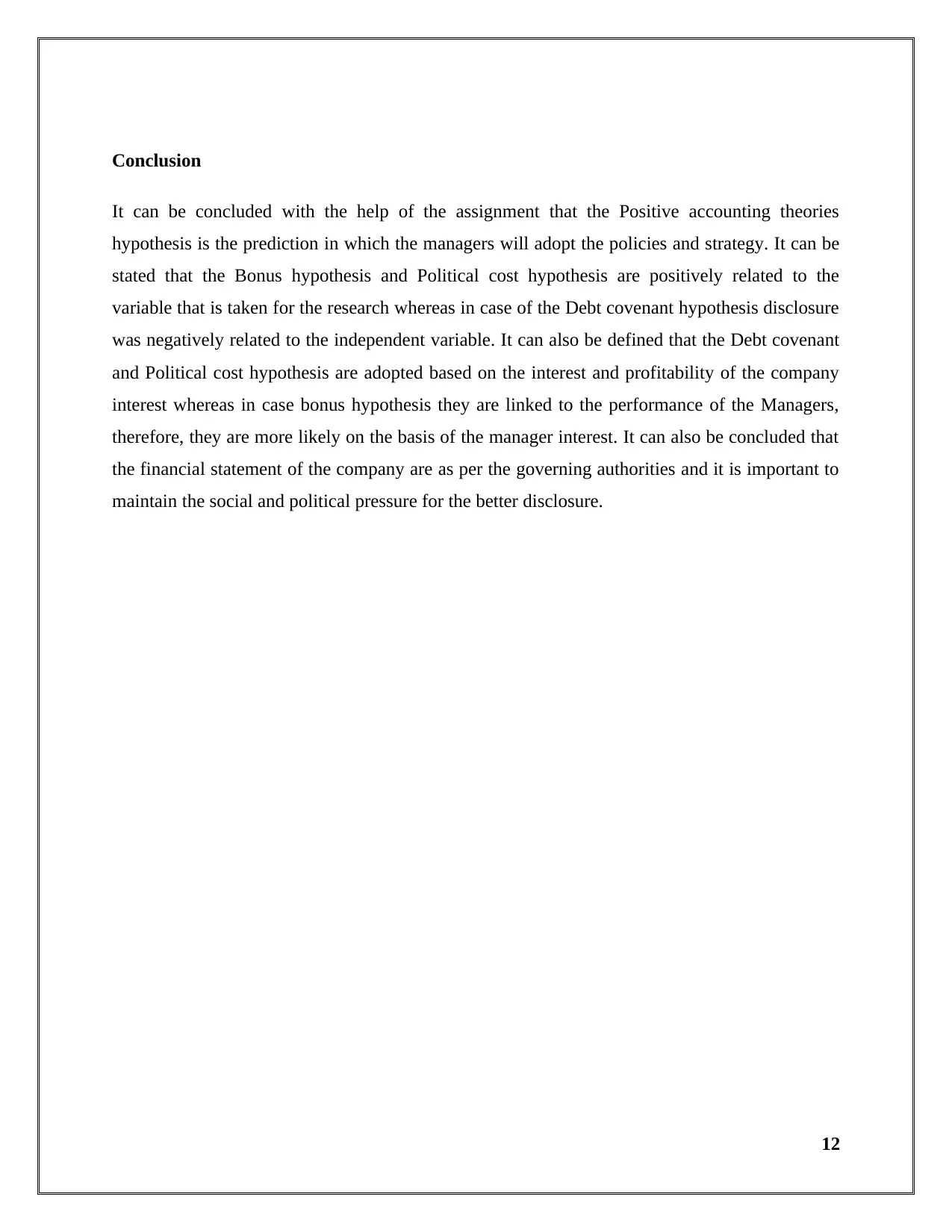
Conclusion
It can be concluded with the help of the assignment that the Positive accounting theories
hypothesis is the prediction in which the managers will adopt the policies and strategy. It can be
stated that the Bonus hypothesis and Political cost hypothesis are positively related to the
variable that is taken for the research whereas in case of the Debt covenant hypothesis disclosure
was negatively related to the independent variable. It can also be defined that the Debt covenant
and Political cost hypothesis are adopted based on the interest and profitability of the company
interest whereas in case bonus hypothesis they are linked to the performance of the Managers,
therefore, they are more likely on the basis of the manager interest. It can also be concluded that
the financial statement of the company are as per the governing authorities and it is important to
maintain the social and political pressure for the better disclosure.
12
It can be concluded with the help of the assignment that the Positive accounting theories
hypothesis is the prediction in which the managers will adopt the policies and strategy. It can be
stated that the Bonus hypothesis and Political cost hypothesis are positively related to the
variable that is taken for the research whereas in case of the Debt covenant hypothesis disclosure
was negatively related to the independent variable. It can also be defined that the Debt covenant
and Political cost hypothesis are adopted based on the interest and profitability of the company
interest whereas in case bonus hypothesis they are linked to the performance of the Managers,
therefore, they are more likely on the basis of the manager interest. It can also be concluded that
the financial statement of the company are as per the governing authorities and it is important to
maintain the social and political pressure for the better disclosure.
12
⊘ This is a preview!⊘
Do you want full access?
Subscribe today to unlock all pages.

Trusted by 1+ million students worldwide
1 out of 13
Related Documents
Your All-in-One AI-Powered Toolkit for Academic Success.
+13062052269
info@desklib.com
Available 24*7 on WhatsApp / Email
![[object Object]](/_next/static/media/star-bottom.7253800d.svg)
Unlock your academic potential
Copyright © 2020–2025 A2Z Services. All Rights Reserved. Developed and managed by ZUCOL.





